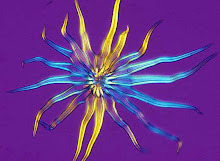
Summer is far from over (I hope!), but when mountain ash Sorbus aucuparia berries ripen you known that autumn is fast approaching. They don’t last long – blackbirds strip the trees very rapidly. There is persuasive scientific evidence now that the fruit juice and pulp of Sorbus fruits inhibit the germination of the seed inside, but passage through a bird’s gut removes this obstacle, and there’s also evidence that a bird’s digestive enzymes weaken the seed coat, making germination easier. While the fruit is being digested the seeds can be carried long distances from the parent plant before they’re voided, so it's no wonder this attractive tree is so widely distributed. Mountain ash berries also feature in the human diet, indirectly. Check out the ingredients in your toothpaste, low calorie food or most diabetic food products and you’ll probably find that they contain the sugar alcohol sorbitol, named after the Latin generic name of the plant that it comes from. Sorbitol was discovered in mountain ash berries by a French chemist back in 1872. It’s used as a sweetener in toothpaste because bacteria in the mouth can’t feed on it, so it doesn’t contribute to tooth decay. It’s used in diet foods as a supplement to artificial sweeteners because it has a lower calorific content than glucose.
For more posts on tree ID click here
For more posts on tree ID click here






















